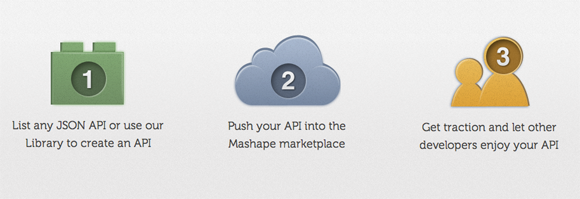Calling itself the “first ever APIs marketplace,” Mashape launched last fall to provide better access and distribution for APIs, and to help developers earn a little cash.
I asked Mashape CEO Augusto Marietti how a marketplace for APIs fits into the growing data economy and why he sees similarities between his company and Etsy. Our interview follows.

Mashape’s API distribution process
What role will marketplaces have in supporting a data economy?
Augusto Marietti: The main mission of a marketplace is to facilitate the exchange of data. It’s a place where you can find, distribute, and buy with the same billing mechanism. This pushes down the barriers for people to participate, and they buy and sell with more confidence and trust. There may be more freedom outside a certain marketplace, but the risk is higher. Is the seller trusted? Can you get your money back? Going outside would mean having more freedom, but the risk is higher.
In a marketplace, you come to know the trusted seller, and there’s a community that supports the buyers and the sellers. It relies on reputation. That, in part, makes you feel more confident with what you’re buying.
You call yourself the “Etsy of cloud services.” Why do you compare yourself to Etsy as opposed to another type of platform?
Augusto Marietti: The unique thing about Etsy is that the products available through it are handmade. We see the world of APIs in the same light.
Ten years ago APIs were only created by big corporations, and even five years ago, many web companies launched without APIs. Now small startups are born with APIs from almost day one. Even more notably, APIs aren’t created just by companies, but by individual developers. These developers have lot of projects that are dying somewhere in their folders, and now they can easily distribute and sell their little projects through the marketplace. That’s the “Etsy concept.”
How can an API marketplace address distribution and discovery?
Augusto Marietti: In some way what’s important isn’t the things that are being traded inside the marketplace but the community that works as its underlying architecture. You want a big community. You want to go where other people are, and often this means you aggregate around interests. APIs are an interest. It’s better to distribute your API in a small place where 100% of the users are familiar with what you’re selling.
But the buyer also wants to go to the supermarket that has everything. That puts pressure on the producer to put their products there. You can open your private shop and try by yourself, but if you don’t have something special or you’re selling a general purpose item — and APIs are becoming a general purpose item — you have to wonder how long you can stay in business.
Obviously, you may lose control over your product if it’s in someone else’s store. That’s why the community part of the marketplace is important. But in our case, we’re not trying to lock someone into the marketplace. With an API, it’s not a “here or there” scenario.
This interview was edited and condensed.
Related:
